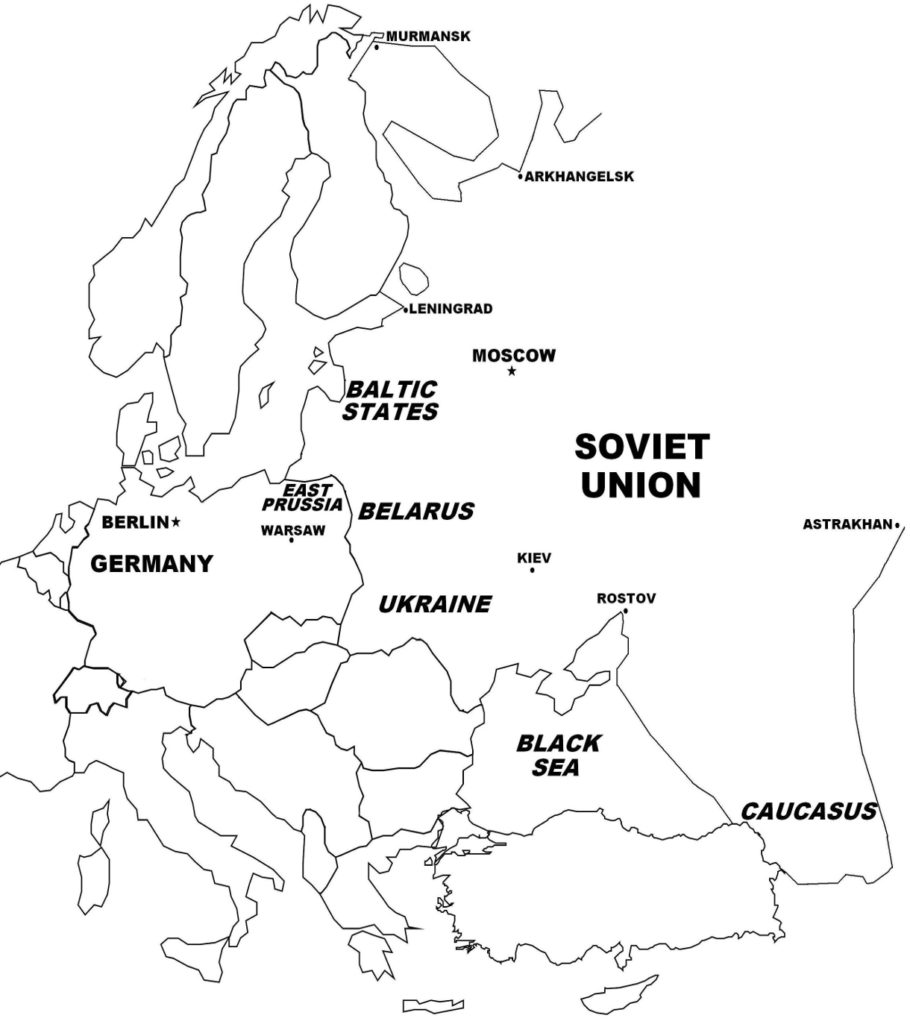Shortly after 3 AM on June 22, 1941, Germany launched its invasion of the Soviet Union, with thousands of artillery pieces opening a massive, coordinated bombardment of Soviet positions all along the 1,800-mile frontier. German special operations teams, positioned along the border, seized key road and water crossings, and assisted by local anti-Soviet militants, set about disrupting and severing Red Army communication lines. At first light, hundreds of Luftwaffe bombers and fighters took to the sky, and attacked strategic targets, including airfields, armories, and military, communications, and supply centers. These air attacks were massively successful, and the Soviet air force lost 1,400 planes on the first day and 3,100 by the third day, against only 78 German planes downed. These German air successes came as a result of Luftwaffe air reconnaissance missions conducted over Soviet territory in the previous months. Stalin had ordered Soviet anti-aircraft crews not to fire on the German reconnaissance planes, so as not to provoke Hitler. Thus in one stroke, the Luftwaffe achieved complete air supremacy over the battlefield.

German land forces and their Axis partners, comprising the bulk of the invasion, crossed the borders from East Prussia in the north to the Carpathian Mountains in the south into the Soviet Union, with Army Group North aiming for its final objective, Leningrad, Army Group Center for Moscow, and Army Group South for the Ukraine and Caucasus, with all three army groups taking the Soviet border and forward defenses by surprise. The Luftwaffe seizing control of the skies, the destruction of Soviet communications and forward military infrastructures, and Stalin’s order not to retaliate to German provocations (which produced chaos at the Soviet frontlines; the order would not be revoked until several hours after the German attack) allowed German and Axis forces to make rapid progress.
Precursor Operation Barbarossa was delayed because Hitler intervened in the Balkans in support of his beleaguered ally, Italian leader Benito Mussolini. In December 1940, the invasion plan was finalized as Operation Barbarossa, set for May 15, 1941. By spring 1941, Operation Barbarossa’s planned launch date of May 15, 1941 increasingly appeared difficult to achieve: an unusually rainy winter flooded rivers and had turned Russian roads into impassable quagmires; troop transport vehicles from France, as well as oil supplies, were delayed; and the Luftwaffe forward airfields in Poland were not yet completed. Then in April 1940, Hitler was forced to launch the invasions of Greece and Yugoslavia following his ally Benito Mussolini’s disastrous campaign against the Greek Army.
The plan overcame opposition from the German High Command which doubted its economic benefits to Germany, that albeit the agricultural and mineral resources of Ukraine and petroleum wealth of the Caucasus, the Soviet Union as a whole would be an economic drain on Germany. The German High Command also wanted the capture of Moscow as the invasion’s foremost aim, which Hitler rejected, pointing out that although French leader Napoleon Bonaparte had captured Moscow in 1812, French forces were still driven back from Russia. What therefore prevailed were Hitler’s stated priorities for the operation, “Leningrad first, the Donbass [eastern Ukraine] second, Moscow third” – that is, Moscow was of “no great importance”, but that the Soviet Red Army must be destroyed in the regions west of Moscow, specifically to the west of the Dvina and Dnieper rivers. Hitler’s main aim in Russia was to achieve lebensraum and acquire that country’s vast territories and enormous agricultural, mineral, and industrial resources that would finally end Germany’s chronic shortage of raw materials for its ever growing population, industry, and military.
Aftermath To this day, historians continue to deliberate whether Hitler’s decision to intervene in Greece and Yugoslavia indirectly caused the failure of Operation Barbarossa, Germany’s invasion of the Soviet Union. Proponents state that the Balkan intervention forced Germany to delay Operation Barbarossa, moving back the earlier launch date of May 14, 1941 to June 22, 1941, or at the very least, that Germany had to await the outcome of its Balkan campaign before it could invade the Soviet Union. Opponents argue that other factors, not the Balkan campaign, forced Germany to delay Operation Barbarossa, including flooded rivers in Eastern Europe resulting from an unusually wet winter, incomplete logistical preparations, and the need to secure its Balkan flank from a possible British attack. In this way, they conclude that Germany’s invasion on June 22, 1941 was doomed to failure from the start. (Excerpts taken from Wars of the 20th Century: Volume 6 – World War II in Europe.)
